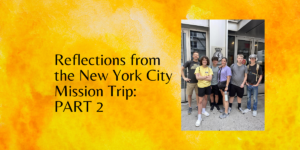One of the most significant events in the church’s life occurred in the late 1960’s.
Prior to that time, the church had played a major role in the work of the Mecklenburg Baptist Association. As mentioned before, the church was asked by the Association in 1956 to sponsor a new congregation, Sunset Road Chapel, and remained a large financial supporter of that church until 1969 when Sunset Road voted to become autonomous. Along with Hickory Grove, St. John’s hosted the annual meeting of the Association in 1966. The minutes from that meeting indicate that St. John’s was one of the four largest financial contributors to the Association- First Baptist ($4,800), Pritchard ($4,000), St. John’s ($3,700), and Myers Park ($3,300).
However, long time relationship became highly divisive when St. John’s adopted a new baptism policy on March 19, 1967, which, in part, stated the following:
1) We consider baptism to be an act of obedience following conversion. Such baptism is “believer’s baptism”.
2) We will baptize new converts by immersion, the mode used in New Testament times, and which most fully portrays the symbolic meaning of baptism, death, burial, and resurrection.
3) In the reception of candidates from other denominations, we are primarily concerned about the reality of the candidates’ experience of conversion and commitment. We will accept a candidate’s baptism as valid, without regard to mode, if it was an act of obedience following conversion.
4) If a candidate’s baptism was other than believer’s baptism, the candidate will be immersed.
5) We intend this affirmation of belief and practice shall lead to a deeper appreciation for historic and present meaning of baptism in the life of the believer, and in the life of the church.
“As a result of this action, forty-six ministers, in independent action outside the normal channels for dealing with Associational business, signed a statement concerning baptism with a proposed amendment to the Association’s constitution. This statement was sent to the member churches with the request that the churches “encourage” their messengers to vote for the amendment at the meeting in October. The amendment would require that member churches in the Association “use the New Testament as a statement of their faith and church polity” and immerse all who became members of the church. Along with several other ministers, the ministers of the St. John’s oppose the action as an attempt to usurp the freedom of a local church to determine its own affairs and as an effort to make the Association a creed-making body, both of which were clear violations of mainstream Baptist life through the centuries” (“Pastor’s Paragraphs”, Family News, August 11, 1967)
At the annual meeting on October 20, 1967, the Association by a vote of 214 to 130 adopted the amendment, effective at the meeting in 1968.
As a result, in October 1968, the church sent a message to the Association requesting that the letter be read and included in the minutes:
“Last year, messengers present for the annual meeting adopted a bylaw which imposes a creedal or doctrinal test as a condition of membership with the Association. We deeply deplore this action and remind you of the unhappy years of Baptist history when similar efforts introduced discord and division into Baptist life. However, we will not struggle against those who have brought about his action. Although the wording of your bylaw is ambiguous, we are well aware of its real intent. We acknowledge that by the action you have excluded St. John’s Baptist Church from your fellowship. Through the 46 years of her life, St. John’s has enjoyed full and appreciative participation in the work of the Association. Through the current year, we have maintained our full support of the work we have shared together. When the day comes, as we are confident it will, that the Association returns to the simple principles of Baptist cooperative work which have bound us in mutual love and respect for many years, we will be eager to resume our fellowship in service with you,”
As we know, that day never came. The letter was read but a motion was made and approved that it not be included in the minutes.









